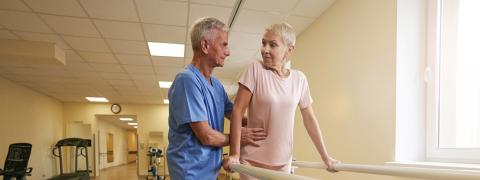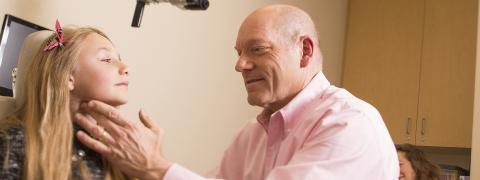What is Sleep Apnea?
If you wake up every morning feeling like you need a nap, sleep apnea may very well be to blame—and you might not even know you have it.
So what is sleep apnea? It’s a chronic disorder affecting approximately 18 million Americans that interrupts breathing during sleep. These interruptions can happen hundreds of times a night, with each event lasting from 10 to 60 seconds. The immediate danger of this condition is that the intake of oxygen is interrupted. “The brain recognizes that it needs to wake the person up in order to get oxygen,” says Paul Manoukian, M.D., M.P.H. of Sierra Nevada Ear, Nose & Throat. “It mostly happens during dream sleep, leaving the person feeling unrested even though they may perceive that they slept normally.”
So are you a sleep apnea sufferer? It can be difficult to self-diagnose because you’re asleep while it’s happening, and apnea cannot be detected during waking hours. For sleep apnea diagnosis and treatment in Reno and the surrounding area, give Sierra Nevada Ear, Nose & Throat a call today.
Sleep Apnea Symptoms
Do any of these symptoms sound familiar? If so, you may want to see an ear, nose and throat specialist to determine whether or not you suffer from sleep apnea.
- Loud snoring
- Interruptions in breathing while sleeping (as noted by another person)
- Waking up suddenly, often with shortness of breath
- Excessive sleepiness during the day
- Insomnia
- Dry mouth/sore throat
It’s Not All About Snoring
Although snoring is a possible sign of sleep apnea, it doesn’t mean all snorers have apnea. Conversely, not all people who have sleep apnea snore. It depends on many factors, including which type of apnea you suffer from. The two kinds of sleep apnea are obstructive and central.
Obstructive sleep apnea, which is the most common type, is a condition in which the airway becomes blocked. This happens when the muscles in the throat become relaxed. Because these muscles support the tonsils, uvula, throat walls and tongue, the airway closes completely or becomes partially obstructed.
Some risk factors that make people more likely to have obstructive sleep apnea include:
- Being overweight
- Having a thick neck
- Being male
- Being older
- Having a family history
- Being a smoker
- Drinking alcohol
- Having nasal congestion
Central sleep apnea is a condition caused by the central nervous system. In this case, the brain fails to send signals to the muscles that control breathing.
Some risk factors that make people more likely to have central sleep apnea include:
- Being older
- Having heart disease
- Using pain medications
- Having had a stroke
Beyond Sleep Apnea
Untreated sleep apnea by itself is a serious problem, but it can also lead to other health concerns. For example:
- People with untreated apnea are four times more likely to have a stroke.
- People with untreated apnea are three times more likely to have heart disease.
- Roughly half of people with untreated apnea have high blood pressure.
- People with untreated sleep apnea are six times more likely to die in a car accident.
In addition to increased mortality rates, sleep apnea can cause depression and memory problems, and may also cause sleep loss in the bedmate of a person with sleep apnea.
The Importance of Diagnosis & Treatment
There are few things that affect our daily lives like getting a good night’s sleep. In addition to impacting an individual’s alertness, function, response time and mood, research from the National Institutes of Health indicate that lack of sleep affects every tissue in the body, leading to increased risk of multiple health issues.
With approximately five percent of the U.S. population suffering from sleep apnea, it is among the most common sleep disorders in the nation. Despite the fact that it is so common, there is no one cause of sleep apnea. That is why professional diagnosis is crucial. The sleep experts at Sierra Nevada ENT can help determine the underlying issues and develop a sleep apnea treatment plan appropriate to your specific health needs.
Putting The Speculation To Bed
If you or a loved one is experiencing some of the signs of sleep apnea, including daytime tiredness and sudden interruptions in breathing while sleeping, it is in your health’s best interest to see a specialist. At Sierra Nevada Ear, Nose & Throat, we can order the proper diagnostic tests including in-clinic sleep studies and at-home sleep studies, which have become more accurate in recent years. Dr. Manoukian says, “Often, apnea patients have other ENT issues like sinus and allergies problems, which we can take care of at the same time. It’s especially important to see a specialist since some conditions like enlarged tonsils or a deviated septum can prevent patients from benefiting from CPAP therapy.”
If you are diagnosed with sleep apnea, the doctors at Sierra Nevada Ear, Nose & Throat can treat you with non-invasive solutions. “Our approach is multidisciplinary,” says Dr. Manoukian. “We involve measures like weight loss and exercise, CPAP and other breathing devices, and dental appliances before surgery is even a consideration.”
Sleep Apnea Treatment in Reno
Sierra Nevada ENT offers diagnosis and treatment for sleep apnea in a caring, safe and professional setting. With locations in Reno, Carson City, Gardnerville and Fallon, our team has been proudly serving Northern Nevada and the surrounding area for over 25 years.
We are committed to helping you achieve the good night’s rest that you deserve. Call to schedule an appointment today. Your body will thank you!
- Education



